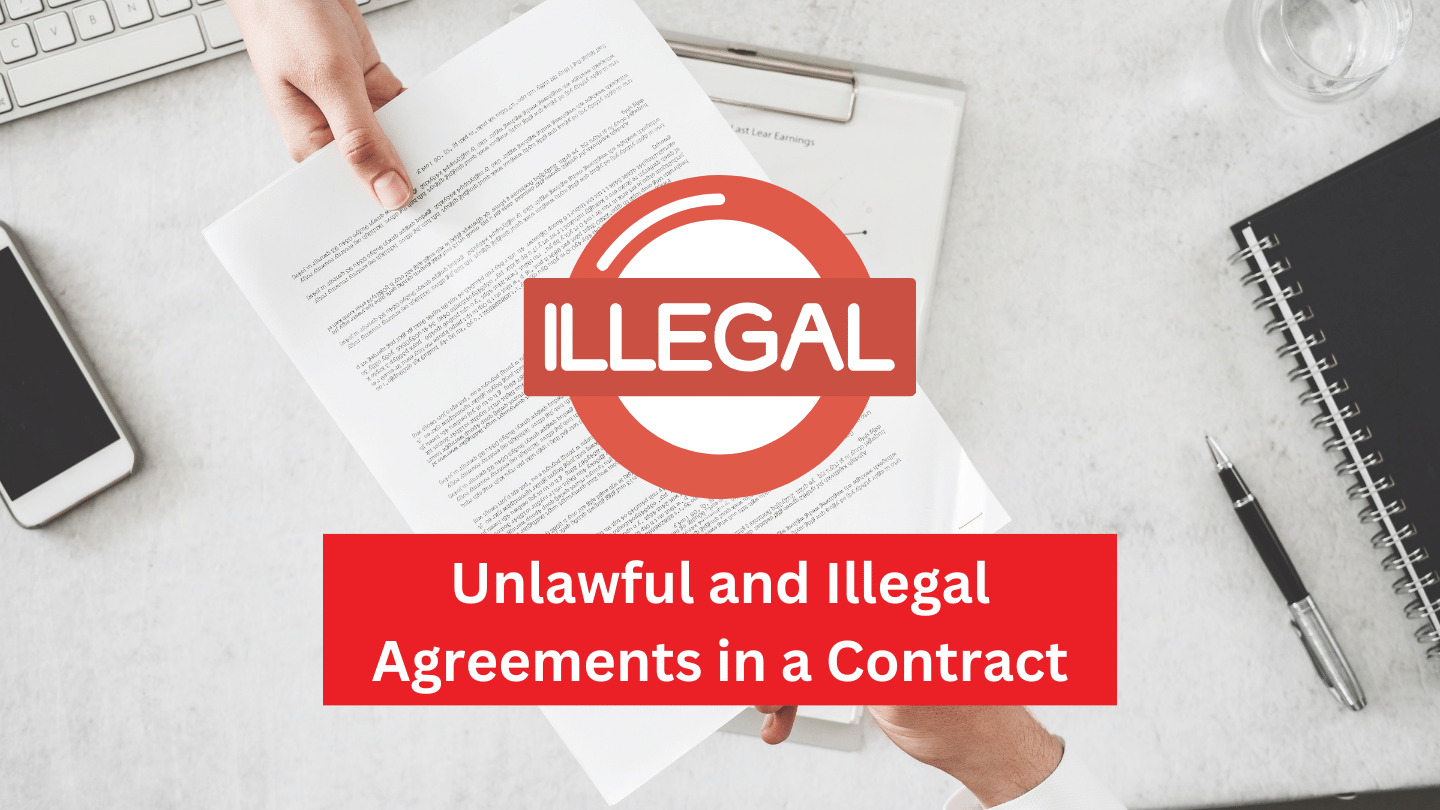Agreements form the backbone of various transactions and relationships, but not all agreements are lawful or legal. This article delves into the distinctions between unlawful and illegal agreements, shedding light on their implications and consequences.
Illegal Agreements:
An illegal agreement refers to a contract or understanding between parties that involves actions or objectives expressly prohibited by law. These agreements often include elements of criminal activity, such as fraud, theft, or any conduct that violates established legal statutes. Engaging in or facilitating such agreements can lead to serious legal consequences, including civil liabilities and potential criminal charges.
Example of an Illegal Agreement: Bribery in Contracting
An explicit example of an illegal agreement is a scenario involving bribery in contracting. Let’s consider a fictitious situation to illustrate this:
Scenario:
Company A is bidding for a government construction project, and Individual B, a government official responsible for awarding contracts, approaches Company A with an offer. Individual B proposes that if Company A pays them a significant sum of money, they will ensure that Company A wins the contract.
Elements of Illegality:
- Bribery: The act of offering or accepting a bribe is illegal and goes against anti-corruption laws and ethical standards.
- Abuse of Authority: Individual B, as a government official, is abusing their authority for personal gain, which is against the law.
Consequences:
- This agreement is illegal as it involves corruption, bribery, and an abuse of official position.
- Both Company A and Individual B could face severe legal consequences, including fines and imprisonment.
- The contract awarded through bribery may be voided, leading to financial losses for Company A.
- Individual B may face termination, legal action, and damage to their professional reputation.
This example emphasizes the serious legal and ethical ramifications of engaging in illegal agreements, particularly those involving corruption and abuse of power.
Unlawful Agreements:
Unlawful agreements, on the other hand, may not necessarily involve actions that are inherently criminal. Instead, they go against public policy or legal principles. These agreements may have terms or objectives that contradict established laws or societal norms, rendering them unenforceable in a court of law. While not criminal in nature, unlawful agreements still face legal challenges and may result in civil consequences.
Example of an Unlawful Agreement: Employment Contract Violating Labor Laws
An instance of an unlawful agreement can be found in the context of employment contracts that violate labor laws. Let’s explore a hypothetical scenario to illustrate this:
Scenario:
Company X hires Employee Y under the condition that Y will work excessively long hours without breaks, below the minimum wage, and without any employment benefits. In return, Employee Y is fearful of losing their job and reluctantly agrees to these terms.
Elements of Unlawfulness:
- Violation of Labor Laws: The terms of the agreement go against established labor laws that mandate fair working conditions, minimum wage requirements, and benefits for employees.
- Coercion and Lack of Fair Bargaining Power: Employee Y agrees due to fear of job loss, indicating a lack of genuine consent. This coercion undermines the principle of fair bargaining power in contracts.
Consequences:
- The employment agreement is unlawful as it violates labor laws designed to protect workers’ rights.
- Company X may face legal actions, penalties, and fines for breaching labor regulations.
- Employee Y, despite agreeing to the terms, can challenge the agreement in court, asserting that it is unconscionable and against public policy.
This example highlights the significance of adhering to labor laws and ensuring fair and equitable agreements in the employment context. Unlawful agreements in employment can lead to legal repercussions and damage the reputation of the employer.
Effects of Illegal Agreements:
Engaging in illegal agreements can have significant legal and practical consequences for the parties involved. Here are some key effects:
- Unenforceability in Court:
Courts generally do not enforce illegal agreements. Parties cannot seek legal remedies or damages arising from a contract that involves illegal activities.
- Void and Non-binding:
Illegal agreements are considered void ab initio, meaning they are void from the beginning. The contract is treated as if it never existed, and neither party is bound by its terms.
- Potential Legal Consequences:
Individuals involved in illegal agreements may face legal repercussions, including fines or imprisonment, depending on the nature of the illegality. Courts may penalize parties for their participation in unlawful activities.
- Ineligibility for Court Protection:
Courts will not provide protection or assistance for parties engaged in illegal activities. If a dispute arises related to an illegal agreement, the court is unlikely to intervene on behalf of either party.
- Public Policy Considerations:
Illegal agreements often conflict with public policy and societal norms. Courts aim to discourage activities that are detrimental to the welfare of society, and as such, they refuse to support such agreements.
- Restitution and Disgorgement:
In some cases, courts may order restitution or disgorgement of any benefits gained through the illegal agreement. This is aimed at preventing unjust enrichment resulting from unlawful activities.
- Damages to Reputation:
Engaging in illegal agreements can lead to reputational damage for individuals or businesses involved. This damage may extend beyond the legal consequences and effect relationships with customers, partners, or the public.
Effects of Unlawful Agreements:
Engaging in unlawful agreements can have various consequences, affecting both the legal standing and practical outcomes of the parties involved. Here are the key effects:
- Void and Unenforceable:
Unlawful agreements are typically considered void and unenforceable in a court of law. Courts will not uphold or enforce contracts that involve illegal activities or violate the law.
- Legal Consequences:
Parties entering into unlawful agreements may face legal consequences, including fines, penalties, or even imprisonment, depending on the nature and severity of the unlawful activities.
- Ineligibility for Remedies:
Courts will not provide remedies or protection to parties involved in unlawful agreements. If a dispute arises, the court is unlikely to intervene in favor of either party, as the agreement is against the law.
- Public Policy Considerations:
Unlawful agreements often conflict with public policy and societal norms. Courts aim to discourage activities that undermine the well-being of society, and as a result, they do not support agreements that violate the law.
- Restitution and Disgorgement:
Courts may order restitution or disgorgement of any benefits obtained through unlawful agreements. This is a measure to prevent unjust enrichment resulting from activities that breach legal standards.
- Civil and Criminal Liability:
Parties involved in unlawful agreements may face both civil and criminal liability. In addition to legal penalties, individuals or entities may be held accountable for damages resulting from their unlawful actions.
- Reputational Damage:
Engaging in unlawful agreements can lead to significant reputational damage. This damage extends beyond legal consequences and can affect relationships with stakeholders, customers, and the public.
- Financial Loss:
Parties may incur financial losses due to the unenforceability of unlawful agreements. Investments, payments, or other considerations made under such agreements may not be recoverable through legal means.
Enforceability and Voidability: Legal Complexities
Unlawful and illegal agreements both encounter challenges in enforcement, but nuances exist. Explore the differences in terms of enforceability and voidability, acknowledging the legal complexities that may arise when parties seek remedies for breached agreements.
Public Policy Considerations: The Role in Validity
Public policy plays a pivotal role in determining the legality of agreements. Assess whether an agreement aligns with societal values and legal frameworks, delving into how public policy considerations impact the validity of contracts.
Consequences and Penalties: A Legal Landscape
The consequences of entering into unlawful or illegal agreements vary. From fines and damages in civil cases to potential imprisonment in criminal scenarios, understanding the potential penalties becomes essential for those navigating the legal ramifications.
Avoidance and Mitigation Strategies: Legal Provisions
To navigate the legal complexities surrounding unlawful and illegal agreements, individuals and businesses must adopt avoidance and mitigation strategies. This involves leveraging legal counsel, conducting due diligence, and implementing proactive measures to ensure compliance with legal standards.
Conclusion
In the intricate web of agreements, distinguishing between unlawful and illegal is vital. Navigating the legal landscape requires a nuanced understanding of these terms, their implications, and the strategies to ensure compliance while safeguarding one’s interests.










